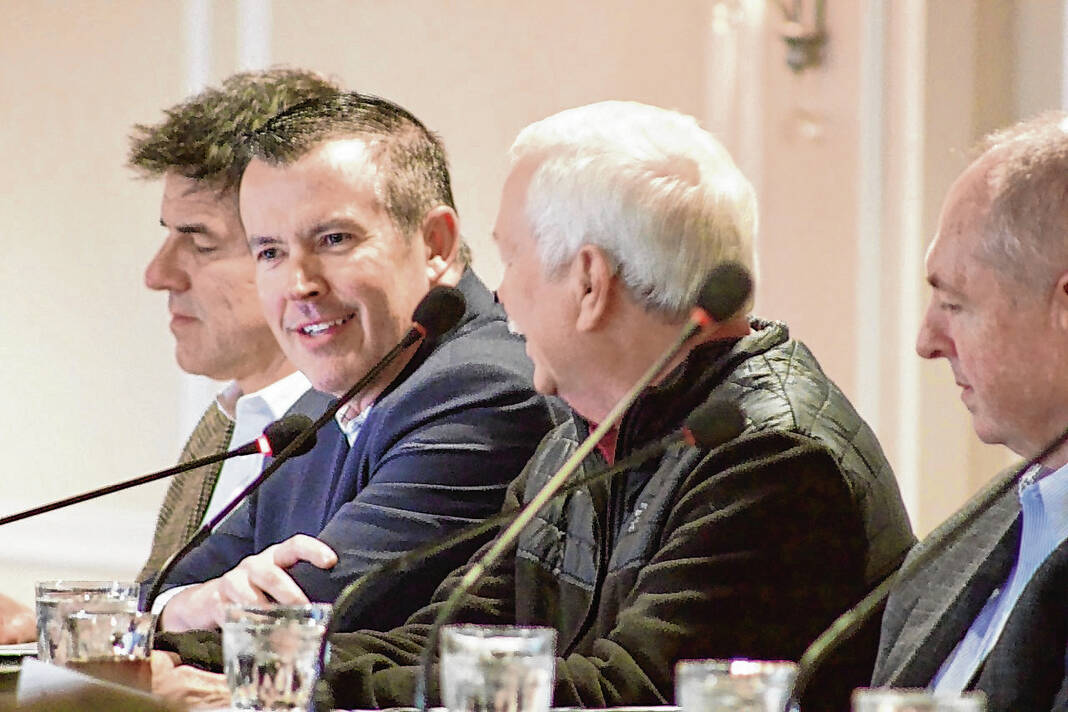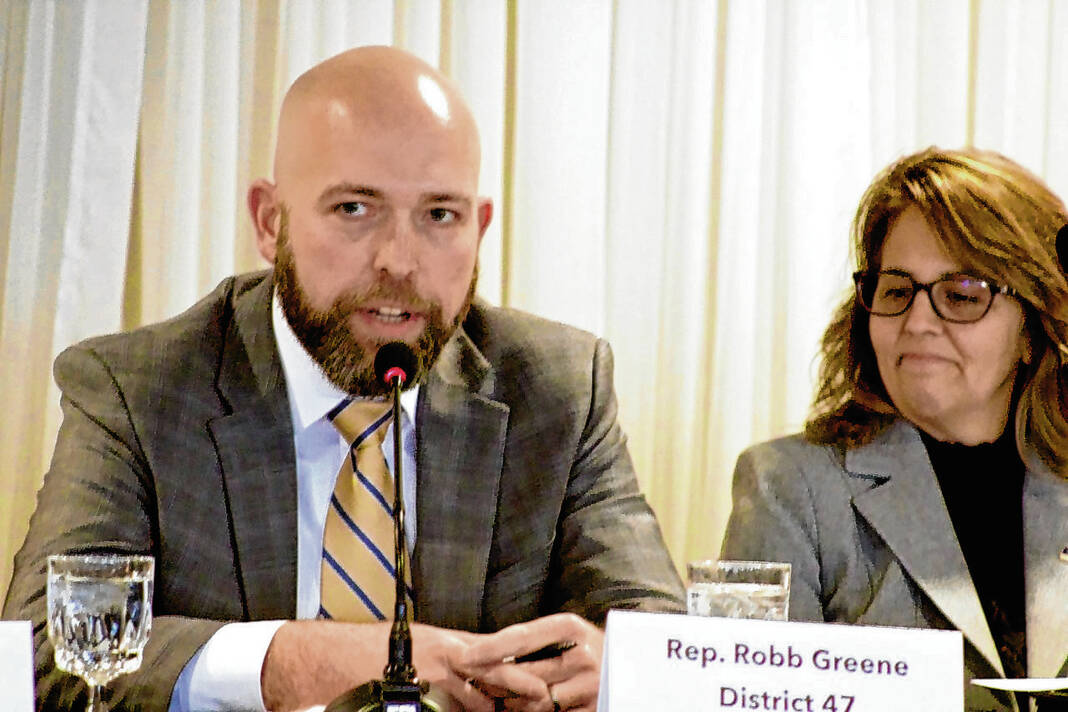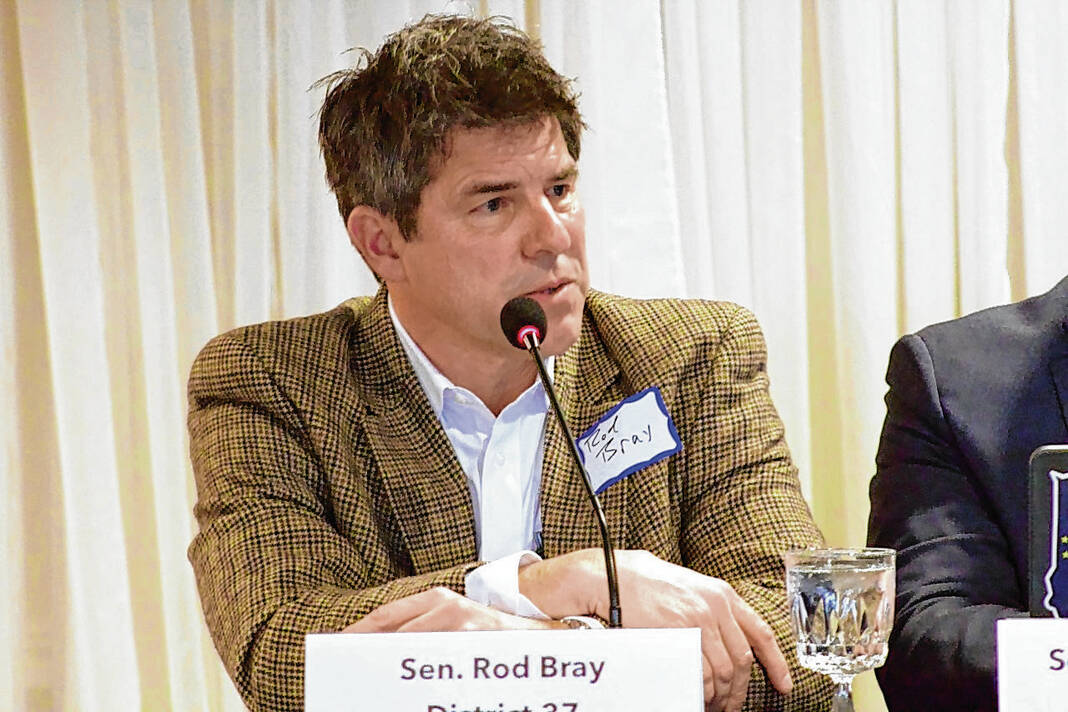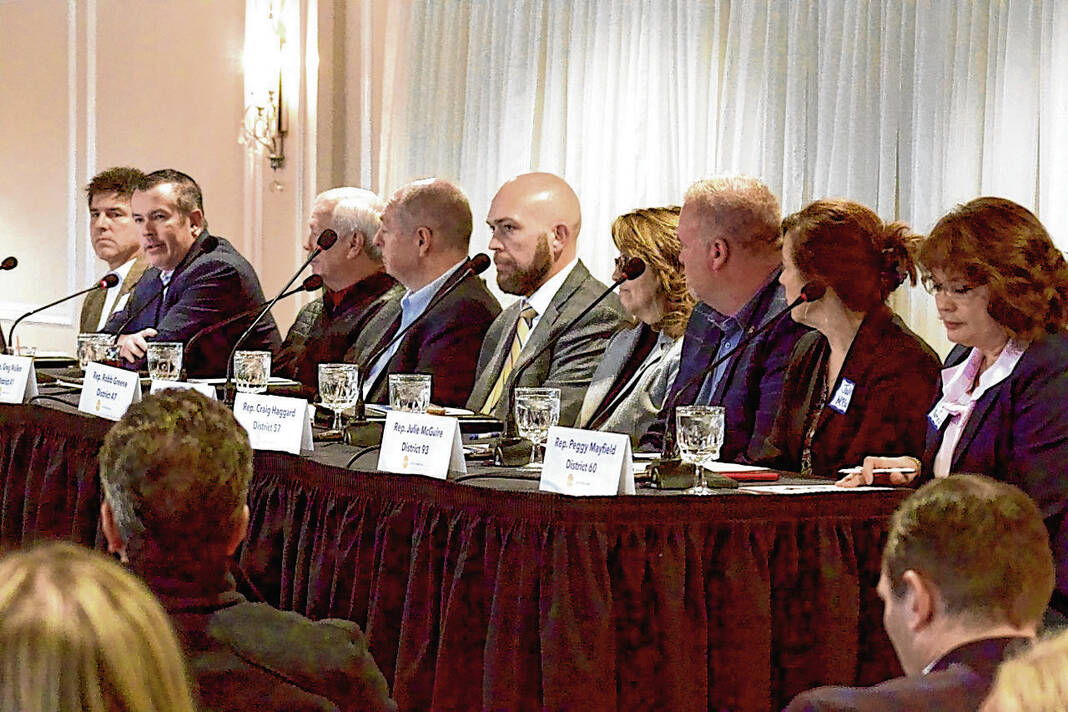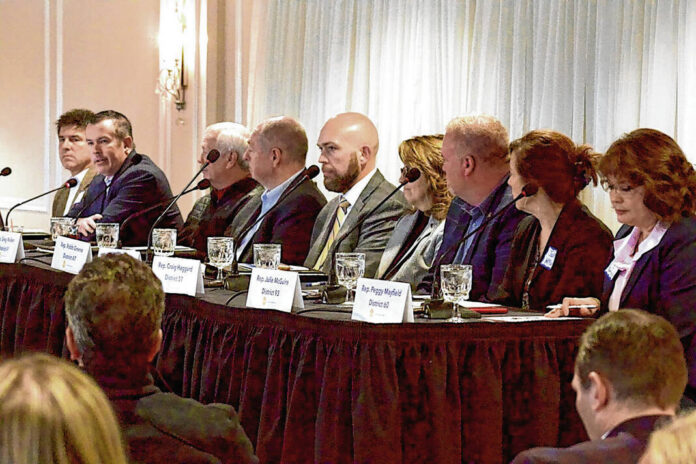
State lawmakers representing Johnson County and the southside of Indianapolis spoke about the current legislative session at Aspire Johnson County’s Legislation Matters luncheon Friday.
Johnson County’s delegation of state lawmakers talked business issues and laid out some of their priorities to area business leaders on Friday.
All eight lawmakers representing Johnson County, and one lawmaker from the southside of Indianapolis spoke on a panel at Aspire Johnson County’s annual Legislation Matters State Lawmakers Luncheon. The group of legislators returned to the Statehouse this week for the 2023 legislative session, where they will spend the next few months drafting and voting on new state policies and working on the state’s two-year budget.
This session, lawmakers are not only tackling drafting the budget, but they are also focused on a number of additional priorities as a body, including public health and mental health spending, education funding, workforce development and curbing health care costs.
Each of the lawmakers also discussed some of their own priorities, and bills they are working on this session during the panel on Friday.
Budget talk
With the budget session, Senate Republicans particularly are prioritizing fiscal responsibility this year, Senate President Pro Tem Rodric Bray, R-Martinsville, said.
Bray talked about the most recent state budget forecast report from this winter, which predicted Indiana’s economic outlook isn’t as rosy as it has been in past years. It predicts a slight recession in the beginning of the fiscal year, he said.
The budget forecast predicts around $600 million new dollars coming in per year, which is not a ton of money in the grand scheme of a $40 billion budget, Bray said on the panel.
“We have to take these new some of these new spending programs and some really good ideas and we just have to make a really difficult decision because money is finite resource, and it certainly will be in this budget,” Bray said.
Indiana does still have a lot of cash in reserves, about $6 billion.
Rep. Peggy Mayfield, R-Martinsville, reiterated Bray’s sentiments about maybe not every state program getting everything it asks for in budget requests. Mayfield sits on the House Ways and Means Committee, which is charged with hearing state department budget requests, and drafting and hearing the state budget first, before it heads to the Senate.
“There will be limitations. Tons of great ideas, but everything costs money and it’s a matter of are you going to nickel and dime that $100 million, nickel and dime, or $1.2 billion,” Mayfield said. “You have to prioritize that and what you can do this year and next year.”
Some of the big-ticket spending items on the table for this budget focus on public health and education. Exactly where lawmakers will land on those at the moment is still unclear.
Though these weren’t discussed at the event, Gov. Eric Holcomb has tasked lawmakers with increasing spending to expand public health programs and also to eliminate public school textbook fees. Holcomb asked for $347 million over the course of the next two-year budget to expand public health infrastructure. He also called for $1.1 billion for K-12 tuition support and an additional $120 million to pay for textbooks and curriculum material.
Another budget increase expected this year is raising pay for Indiana State Police troopers, which Bray said is a Senate priority. The governor has said he wants $30 million to raise state troopers’ starting salary to $70,000.
Addressing workforce issues
Workforce was another issue brought up during the panel, prompted by a question from the audience asking about the workforce shortage.
Rep. Julie McGuire, R-Indianapolis, who is new to the Statehouse this year, said workforce shortages are hitting every sector, not just the most talked about like teachers and health care.
She and other lawmakers emphasized that the House is working on revamping high school education, and coupling that with workforce development.
“Reinventing high school” is one of the top priorities for House Republicans this year. House Bill 1002, for example, seeks to expand work-based learning in Indiana high schools, such as apprenticeships, job shadowing and internships. The bill would also create a framework for students to earn a post-secondary credential before leaving high school.
Rep. Michelle Davis, R-Whiteland, who has a background in adult education, also said work-based learning is important to helping change education and help with workforce issues.
Davis is a co-author on HB 1002, and is working on other adult education bills as well.
An issue she pointed out though, is many employers are not as willing to take on high school students as interns or for job shadowing. She recently visited Greenwood Community High School to listen to several high school seniors present their capstone projects. All of the students said they could not find a local business willing to let them job shadow.
“It’s going to take all of us to be able to create these opportunities to create more pipelines,” Davis said.
Bray asked the crowd to hold up a green or red card if they’d be interested, or not interested, in taking high school students on for internships. The crowd were given these cards as a way to show their thoughts on certain policy issues discussed at the panel.
From Bray’s question, many people in the room held up green cards. No one held up a red card.
Sen. Greg Walker, R-Columbus, added that childcare and mental health also play a role in the workforce shortage. He said the legislature is focusing on expanding mental health services and access to childcare would likely bring people back into the workforce.
One oversight in unemployment rates is those numbers do not capture people who are choosing not to work, and not actively seeking jobs, Walker said.
“If you were to return one-quarter of able-bodied people that are not seeking work to the workplace. I think that’s about 40,000 people in the state of Indiana,” Walker said.
State policy and innovation
One question prompted the lawmakers to address if state policy is keeping up with growing innovation in the state.
Bray said generally, it’s not the Legislature’s job to innovate, but rather stay out of the way for businesses to thrive.
“Our job first and foremost is to make sure that the table is set so businesses can go out there and grow themselves,” Bray said.
He added he would like to see maybe a couple hundred million dollars dedicated in the budget for companies already in Indiana to get some investment dollars. The state currently, through the Indiana Economic Development Corp., invests millions each year into incentivizing companies from out of state to come to Indiana. Bray said he’d like to see some money go to helping the businesses here, which can also benefit the state.
Indiana, more recently, has been investing time into economic development and innovation in the state. For example, the Legislature last year passed a bill that allowed the state to create “innovation development districts,” where the state can capture land and use some tax revenue for future business developments. Lawmakers also made some of the IEDC’s incentive tools to financially attract businesses more flexible last year.
Sen. Jack Sandlin, R-Indianapolis, agreed that lawmakers generally should stay out of business development, but he said attractive state tax policies can help with innovation as well.
Senate Republicans in particular are looking at eliminating the state income tax in the future, as well as making changes to property taxes, including the business personal property tax.
“If we can do a better job and tax policy, it will help everybody across the board,” Sandlin said.
Mayfield and Sen. Aaron Freeman, R-Indianapolis, both have bills this year that would increase the threshold for the business personal property tax exemption from $80,000 to $250,000.
Other priorities
The lawmakers also discussed some of their own bills and priorities for this session.
New Rep. Craig Haggard, R-Mooresville, talked about a bill related to an oversight in a law about drug dealing. Right now, there is a law that makes it a Level 1 felony if someone deals drugs that kills someone, however, there is not a law in place that addresses when someone is left with serious bodily injury. Haggard’s bill would change that, he said.
For Sandlin, one of his priorities is mental health and expanding mental health access. That is a priority of Senate leadership as well, with Senate Bill 1. SB 1 would provide around $30 million in ongoing funding to build out a system of certified behavioral health clinics around Indiana.
“Looking at the issue of mental health in Indiana … this is a fundamental change because it’s been a long time coming, and I’m going to do everything I can to support it,” Sandlin said.
Freshman Rep. Robb Greene, R-Shelbyville, talked about his priority to be an advocate for the special needs community, which is a passion of his because he has a child on the autism spectrum.
An issue Greene noticed is that many people with autism, or other disabilities have trouble finding work, or they are often left out of workforce development conversations. He authored a bill that would give a tax credit incentive to employers who make an effort to hire people with special needs, such as those on the autism spectrum.
“It goes beyond politics for me. It’s something that has driven me as a freshman to get out there. I’ve driven around the state meeting with anybody and everybody that could benefit from this,” Greene said.


